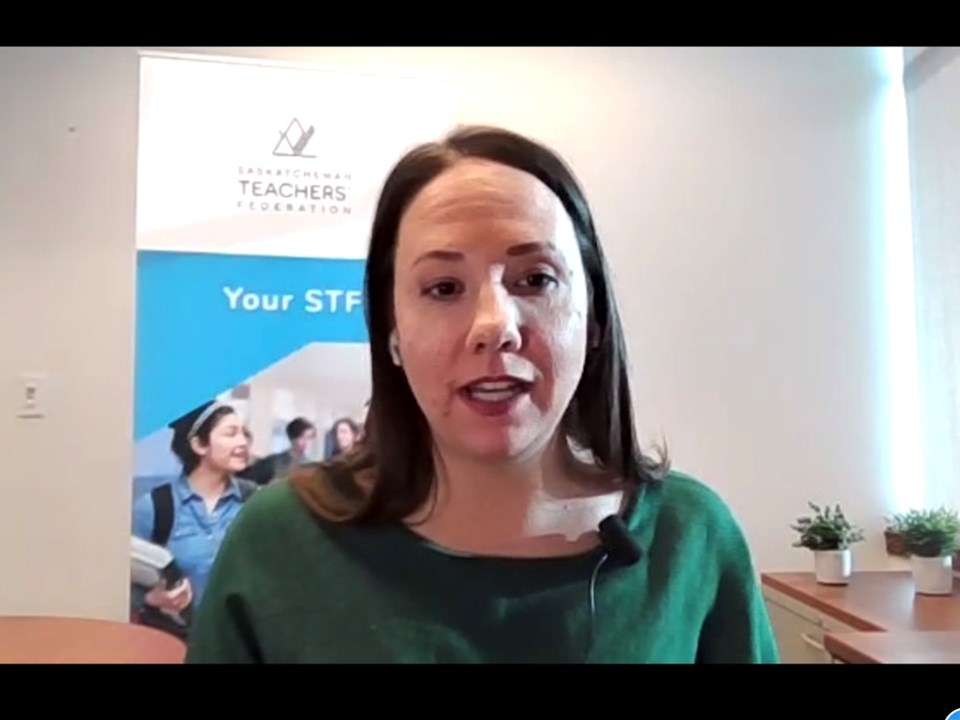REGINA - Saskatchewan Teachers Federation is weighing their next steps in collective bargaining with the provincial government after receiving a conciliation panel’s report.
The conciliation board prepared their report in an effort to bring the parties closer together, after the STF declared an impasse in negotiations with the Government-Trustee Bargaining Committee late last year. There were five days of conciliation talks between Dec. 5 and 12, and according to an STF news release the Board has concluded bargaining on a new provincial collective agreement for teachers remains at impasse.
Speaking in a Zoom call with reporters Monday, STF President Samantha Becotte said that within the conciliation board’s report there was one item the board had comments on, and that was on the issue of classroom complexity. Becotte pointed to this report as supporting their call for classroom complexity issues to be included in the bargaining negotiations, something the province has taken issue with.
“The board agrees with what teachers have been saying for the last 10 years, which is a right to negotiate their working conditions," said Becotte. "And as we have been saying, teachers’ working conditions are our students’ learning conditions. And we have seen this position being supported as well in previous reports that have come through our last two rounds of collective bargaining, as well as other provincial organizations who have negotiated conditions on class complexity, and class-size in their collective agreements. Most recently, teachers in Quebec and Ontario have reached tentative agreements that include articles on class complexity. So this topic isn’t new and it isn’t unreasonable to expect a minimum standard be able to be set across Saskatchewan to ensure teachers can do the good work that they do and support the students that are in their classrooms and to ensure all students coming into Saskatchewan schools have the supports that they need.”
Becotte also spoke of an announcement made earlier Monday by the province of a new pilot project. The government is providing a $3.6 million investment to fund the pilot in eight school divisions for new specialized support classrooms which will focus on helping staff manage and de-escalate behavioural incidents. It starts this February and runs until the end of the 2024-25 school year.
Becotte called this an “interesting start geared to addressing the problems of class complexity. It is a clear admission of government that they agree class complexity is increasing and needs to be addressed, and that additional funds are needed.”
But she noted only eight urban elementary schools were impacted by the pilot project announcement, or just one percent of the students in Saskatchewan. Becotte also had issues with the amount of funding.
“At the same time just a month ago, this government spent approximately a quarter of that amount on a two week event in Dubai. It is clear that students are not where they should be on the government’s list of priorities.”
She also accused the province of “trying to sidestep and take a different course of action” instead of coming to the bargaining table in good faith to address teachers’ concerns.
“We are fighting to ensure students get the high-quality education that they have a right to, here in Saskatchewan,” said Becotte. “It is time that our government makes a real commitment to supporting students in all areas of our province over a longer period of time, rather than just one time top up funding.”
On two other topics, the conciliation report did not provide recommendations as both sides remain too far apart. One was on salary, and the other was on substitute teacher working conditions and conditions of employment.
The STF membership had voted 95 per cent in favor of job sanctions last fall. As for what the next steps will be and whether job action can be avoided, Becotte said the conciliation report “can provide us a starting point with where further talks could go.”
”If the government could provide the GTBC, the Government-Trustee Bargaining Committee, with a renewed mandate that could look at the conciliator’s report as a starting point, as a recognition that teachers do have a right to negotiate those working conditions and the learning conditions in schools, we could get back to the table at any point. We have always communicated that clearly to government and trustees that we’ll go back to the table morning, noon and night, evenings, weekends, holidays… But we need to have that renewed mandate. We cannot just go back to the table and continue to hear no and no and no, or not have a mandate to actually engage in real negotiations. So we’re hopeful that that can happen, although if government continues to be intransigent, and refuse to acknowledge that these are negotiable items, they they’re really not providing us any other choice. And teachers are ready to stand up for themselves, they’re ready to stand up for their students, because it’s about time that this problem starts to get addressed.”
The government has also provided its response to the conciliation board report. Education Minister Jeremy Cockrill issued the following statement this afternoon:
"The Government-Trustee Bargaining Committee has received the report from the Conciliation Board and appreciates the thorough considerations within the report. The GTBC will continue to bargain on items like salary and benefits that are a part of the provincial teacher collective agreement when the Saskatchewan’s Teacher Federation returns to the bargaining table. The GTBC also notes that the Conciliation Board did not recommend class size and composition be included as a part of the bargaining discussions.
"The Government of Saskatchewan remains committed to working with education stakeholders in addressing important issues like classroom composition, as shown with today’s new specialized support classroom pilot, outside of the bargaining process.
"We continue to call on the STF to return to the bargaining table so that negotiations can continue where we can reach a fair deal with teachers while keeping students in the classroom."




